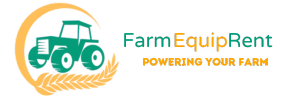
Farming is a cornerstone of the global economy, but running a successful agricultural operation involves considerable costs. From acquiring high-tech machinery to covering day-to-day operational expenses, farmers face immense financial challenges. One cost-effective farming solution gaining momentum is renting farm equipment instead of buying.
This strategic shift can help budget-conscious farmers conserve capital, manage operational expenses, reduce risks, and access advanced technology. This article dives into why renting farm equipment makes financial sense, offering a roadmap for farmers to maximize their resources and secure long-term stability.
Farmers often grapple with the decision of whether to rent or purchase essential equipment. Let’s explore the key financial advantages of renting and how it can positively impact farming operations.
Owning farm machinery requires a substantial upfront investment, which ties up capital that could be used elsewhere. Renting allows farmers to redirect these funds toward vital aspects of their business, such as:
By conserving capital, farmers can strengthen their financial position without compromising productivity.
When purchasing machinery, farmers must also account for long-term costs like:
Rental agreements typically cover maintenance and repairs, ensuring equipment stays in excellent working condition. Additionally, farmers save on storage costs since equipment is only rented when needed. This significantly reduces operational expenses, leaving more room for reinvestment in other areas.
Cash flow is vital to the sustainability of small and medium-sized farms. Renting offers predictable expenses, enabling farmers to budget effectively. Unlike ownership, which often involves variable costs like unplanned repairs, renting ensures financial stability. Farmers can allocate resources more efficiently, minimizing the stress of unexpected outlays.
Farming demands vary seasonally, and owning equipment for occasional tasks can be inefficient. Renting provides the flexibility to scale up operations during peak seasons and reduce costs during off-peak periods.
For example:
This flexibility allows farmers to adapt quickly to changing demands, maximizing productivity.
Farming is inherently risky, with factors like weather unpredictability, market fluctuations, and pests creating financial uncertainty. Renting mitigates many of these risks, offering:
Farm equipment depreciates rapidly, leading to diminished resale values. Renting eliminates depreciation concerns, ensuring farmers only pay for equipment when needed.
Purchasing machinery often involves taking loans or incurring debt, adding financial pressure. Renting eliminates this risk, preserving farmers’ creditworthiness for other essential investments.
Keeping up with technological advancements can be expensive. Renting enables farmers to access the latest GPS-enabled tractors, drones, and IoT devices without investing in ownership. This boosts efficiency while reducing financial strain.
Renting offers valuable tax advantages that make it even more appealing. Farmers can write off rental expenses as operational costs, reducing taxable income and increasing cash flow for reinvestment. Some key tax benefits include:
These advantages enhance financial stability, making renting an integral part of a farm’s financial strategy.
Agricultural success hinges on adaptability. Renting allows farmers to scale operations according to market conditions or crop performance. For instance:
This adaptability ensures efficient resource allocation and financial resilience.
The modern farming landscape relies heavily on technological innovation. However, high-tech tools like autonomous tractors and precision farming devices are often cost-prohibitive. Renting provides an affordable pathway to access these innovations.
By leveraging rentals, farmers can explore cutting-edge solutions and remain competitive without breaking the bank.
Getting started with farm equipment rentals is straightforward:
Renting farm equipment is a cost-effective solution for farmers aiming to reduce expenses, access advanced technology, and enhance financial stability. By conserving capital, mitigating risks, and enjoying operational flexibility, farmers can thrive in today’s competitive agricultural landscape.
Whether you manage a small farm or a large operation, embracing the financial benefits of renting is a smart choice. Start exploring rental options today and secure your farm’s future through smarter, cost-effective strategies.